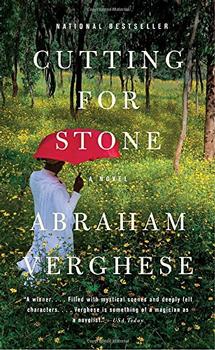Summary | Excerpt | Reading Guide | Reviews | Beyond the Book | Readalikes | Genres & Themes | Author Bio

Critics' Opinion:
Readers' Opinion:
First Published:
Feb 2009, 560 pages
Paperback:
Jan 2010, 560 pages
 Book Reviewed by:
Book Reviewed by:
Lucia Silva
Buy This Book
The Coming
After eight months spent in the obscurity of our mother’s womb,
my brother, Shiva, and I came into the world in the late afternoon of the
twentieth of September in the year of grace 1954. We took our first breaths at
an elevation of eight thousand feet in the thin air of Addis Ababa, capital city
of Ethiopia. The miracle of our birth took place in Missing Hospital’s Operating
Theater 3, the very room where our mother, Sister Mary Joseph Praise, spent most
of her working hours, and in which she had been most fulfilled.
When our mother, a nun of the Diocesan Carmelite Order of Madras, unexpectedly
went into labor that September morning, the big rain in Ethiopia had ended, its
rattle on the corrugated tin roofs of Missing ceasing abruptly like a chatterbox
cut off in midsentence. Over night, in that hushed silence, the meskel flowers
bloomed, turning the hillsides of Addis Ababa into gold. In the meadows around
Missing the sedge won its battle over mud, and a brilliant carpet now swept
right up to the paved threshold of the hospital, holding forth the promise of
something more substantial than cricket, croquet, or shuttlecock.
Missing sat on a verdant rise, the irregular cluster of whitewashed one- and
two-story buildings looking as if they were pushed up from the ground in the
same geologic rumble that created the Entoto Mountains. Troughlike flower beds,
fed by the runoff from the roof gutters, surrounded the squat buildings like a
moat. Matron Hirst’s roses overtook the walls, the crimson blooms framing every
window and reaching to the roof. So fertile was that loamy soil that
Matron—Missing Hospital’s wise and sensible leader—cautioned us against stepping
into it barefoot lest we sprout new toes.
Five trails flanked by shoulder-high bushes ran away from the main hospital
buildings like spokes of a wheel, leading to five thatched-roof bungalows that
were all but hidden by copse, by hedgerows, by wild eucalyptus and pine. It was
Matron’s intent that Missing resemble an arboretum, or a corner of Kensington
Gardens (where, before she came to Africa, she used to walk as a young nun), or
Eden before the Fall.
Missing was really Mission Hospital, a word that on the Ethiopian tongue came
out with a hiss so it sounded like “Missing.” A clerk in the Ministry of Health
who was a fresh high-school graduate had typed out the missing hospital on the
license, a phonetically correct spelling as far as he was concerned. A reporter
for the Ethiopian Herald perpetuated this misspelling. When Matron Hirst had
approached the clerk in the ministry to correct this, he pulled out his original
typescript. “See for yourself, madam. Quod erat demonstrandum it is Missing,” he
said, as if he’d proved Pythagoras’s theorem, the sun’s central position in the
solar system, the roundness of the earth, and Missing’s precise location at its
imagined corner. And so Missing it was.
Not a cry or a groan escaped from Sister Mary Joseph Praise while in the throes
of her cataclysmic labor. But just beyond the swinging door in the room
adjoining Operating Theater 3, the oversize autoclave (donated by the Lutheran
church in Zurich) bellowed and wept for my mother while its scalding steam
sterilized the surgical instruments and towels that would be used on her. After
all, it was in the corner of the autoclave room, right next to that
stainless-steel behemoth, that my mother kept a sanctuary for herself during the
seven years she spent at Missing before our rude arrival. Her one-piece
desk-and-chair, rescued from a defunct mission school, and bearing the gouged
frustration of many a pupil, faced the wall. Her white cardigan, which I am told
she often slipped over her shoulders when she was between operations, lay over
the back of the chair.
Excerpted from Cutting for Stone by Abraham Verghese Copyright © 2009 by Abraham Verghese. Excerpted by permission of Knopf, a division of Random House, Inc. All rights reserved. No part of this excerpt may be reproduced or reprinted without permission in writing from the publisher.




The low brow and the high brow
Click Here to find out who said this, as well as discovering other famous literary quotes!
Your guide toexceptional books
BookBrowse seeks out and recommends the best in contemporary fiction and nonfiction—books that not only engage and entertain but also deepen our understanding of ourselves and the world around us.